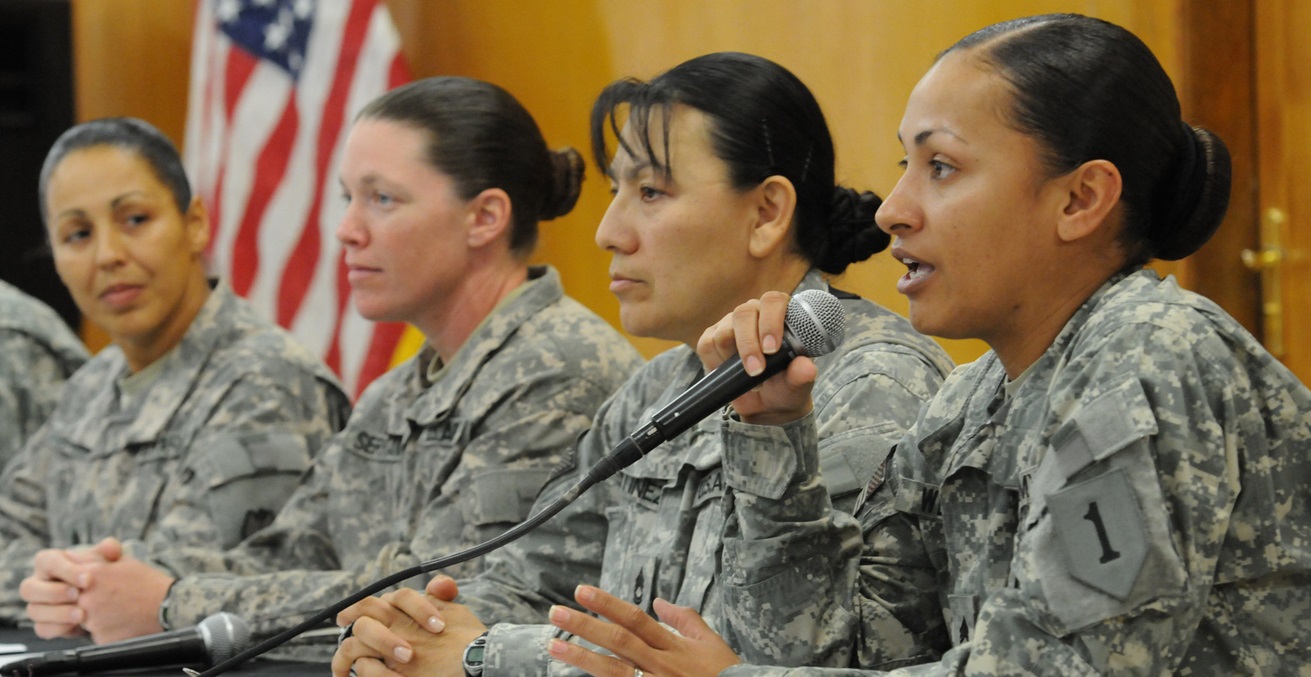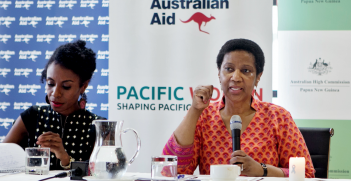Living Up to Our WPS Promise: Promoting American Women’s Inclusion in National Security

The Biden administration has made strong progress in promoting women’s representation in important top national security positions. At the lower level, more needs to be done to increase full gender parity.
In 2017, Congress passed the Women, Peace, and Security (WPS) Act, enshrining in US law decades of American leadership to advance the WPS agenda globally. This agenda centres around a simple principle: countries are more stable and more secure when women are involved in all aspects of peace and security. As the WPS Act states, “the meaningful participation of women in conflict prevention and conflict resolution processes helps to promote more inclusive and democratic societies and is critical to the long-term stability of countries and regions.”
Arguably, there is no country in which the full inclusion of women in all aspects of peace and security decision making is more important than in the United States of America. The United States exerts enormous global influence, shaping multilateral forums, spearheading responses to humanitarian crises, bolstering security alliances, and leading conflict resolution efforts. Yet inside the United States, we see somewhat of a mixed picture when it comes to women’s participation and leadership. For the first time in US history, President Joe Biden appointed a gender-balanced cabinet. Among the Cabinet positions charged with elements of national security, women serve as Secretaries of Treasury, Commerce, and Energy, and as Director of National Intelligence, United States Trade Representative, Director of the Office of Science and Technology Policy, and Ambassador to the United Nations. Outside of the Cabinet, women are serving in key positions, including as Homeland Security Advisor, Deputy Secretary of Defense, Deputy Attorney General, Secretary of the Army, and Coast Guard Commandant.
Yet below the most senior ranks, women remain underrepresented across national security positions compared to the overall US workforce (47 percent) and the federal workforce (44 percent). The American Foreign Service Association estimates that women comprise only 41.9 percent of Foreign Service generalists, 28.9 percent of Foreign Service specialists, and 32.4 percent of the Senior Foreign Service. In 2020, only 28 percent of US Ambassadors were women. According to the Director of National Intelligence’s 2021 annual demographics report, women represent 39.5 percent of the intelligence community’s civilian workforce and 32.4 percent of its senior ranks. In 2021, women comprised 17.3 percent of the active duty military and 21.4 percent of the National Guard and reserves, according to the Department of Defense. A 2023 report by the Government Accountability Office found that the percentage of women civilian employees in the Department of Defense decreased slightly between 2012-2021, from 33 percent to 32.1 percent.
Why are we falling short of gender parity in national security?
There are myriad reasons American women are not participating in national security positions at rates equal to men, or even at rates equal to their participation in other fields. National security positions are often inflexible, and the US falls woefully short in providing support to working families, including paid parental leave and affordable childcare and eldercare. Lack of support in these areas most often affects women’s, and not men’s, ability to stay in the workforce, according to a 2016 study. Many national security positions demand long hours, and teleworking is often not an option because of security concerns. In addition, women who turn down high profile assignments, request flexibility for family considerations, or go on leave without pay can see their career trajectories suffer because of a perceived lack of commitment to the “mission” of national security.
Sexual harassment and sexual assault also affect women throughout the workforce, but the veil of secrecy surrounding national security work and insufficient internal processes for handling such issues have created a culture of impunity. As the #MeToo movement gained momentum globally in 2017, 223 women working in the national security community signed an open letter saying that they, too, had been victims of sexual harassment or assault, or knew others who had. They cited a culture in which such practices were accepted, victims were silenced, and perpetrators were not held accountable. In the time since the letter was published, the situation does not seem to have improved. In 2023, two dozen women CIA employees have reported to authorities and Congress that they experienced workplace harassment or assault, and that the Agency took little action and attempted to keep them from speaking out when they reported it. Reports of sexual harassment and assault in the US military increased by 13 percent in fiscal year 2021 over the previous year, and by another 1 percent in fiscal year 2022.
While challenges such as these contribute to women’s lagging role in national security positions, one issue is not a factor: their preparedness. Women are more than qualified to enter positions in our national security sector. In fact, more women than men (55 percent) are enrolled in graduate programs in international affairs, a figure that has held steady for at least 10 years. Across degree programs and majors in 2019, women earned more bachelors (58 percent), masters (64 percent), and doctoral degrees (56 percent) than men, according to the National Center for Education Statistics.
What can we do about it?
A fundamental shift in how we support women and working families in the United States could have a profound impact on the rates in which women participate in the national security workforce. The United States is one of just six countries that offers no paid parental leave. Although the federal government took an important step in the right direction in 2017 by instituting such leave for federal workers, women working in national security fields might still face challenges if their partner does not have paid leave, particularly when waitlists for childcare can be one year or longer. Taking steps to address the childcare crisis, such as providing subsidies to providers to allow them to pay competitive wages and increase their capacities, would also help alleviate the challenges that hold women back from full participation in the workforce.
National security departments and agencies must also prioritise addressing instances of sexual harassment and assault, and creating a culture of accountability for these crimes, particularly at the Department of Defense (DOD) and within the intelligence community (IC). President Biden has long been a champion for preventing and responding to gender-based violence, and his administration has taken important steps to address these challenges within the national security community, most notably by reforming the Uniform Code of Military Justice to place responsibility for prosecuting sexual assault, domestic violence, and other serious crimes in the hands of special military prosecutors and not individual commanders. In response to the cases in his Agency, CIA Director William J. Burns created a Sexual Assault Prevention and Response Office (SAPRO) and appointed an expert to lead it. DOD and the IC should continue to track data on sexual assault and harassment cases and accountability mechanisms to ensure the changes are having their intended effect and make adaptations if necessary.
National security agencies should take full advantage of the pipeline of female talent emerging from US universities, including by expanding pathways from university programs into federal positions. They should review hiring practices more broadly to ensure they are not discriminating against women and rigorously track progress over time, evaluating their efforts and reforming them when necessary. Ensuring the full participation of women in our national security sector is a national security imperative, and we must not be satisfied with anything short of full gender parity at all levels.
Julia M. Santucci is a senior lecturer in intelligence studies and Director of the Johnson Institute for Responsible Leadership and the Frances Hesselbein Leadership Forum at the University of Pittsburgh Graduate School of Public and International Affairs (GSPIA). She has over a decade of experience in national security and foreign policy positions, having served at the White House, State Department, and CIA. She holds an MA in Near Eastern Studies from the University of Arizona and a BA in history from the University of Dayton.
The views presented herein are solely those of the author and do not necessarily represent the views of the United States Government.
This article is published under a Creative Commons Licence and may be republished with attribution.





